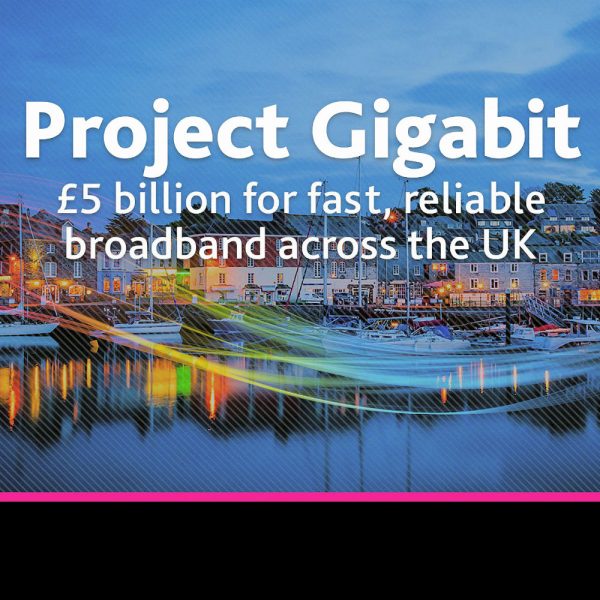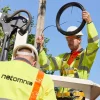Gov Targets Universal UK Gigabit Broadband Coverage for 2030

The UK Government’s £5bn Project Gigabit rollout programme appears to have quietly confirmed that they now aim to deliver “full” 1Gbps broadband coverage to the final 20% of hardest to reach premises by 2030 (effectively universal coverage), at least where it is “value for money to do so.”
Just to recap. Until now, Project Gigabit has generally only tended to express its target as seeking to extend such speeds to reach at least 85% of UK premises by the end of 2025 and to then to get “as close to 100% as possible.” But despite this, we’ve not previously seen a solid date being mentioned for when such universal coverage might actually be achieved.
The project has generally tended to assume that the first 80% of coverage would be achieved by commercial deployments using a mix of different technologies, which is a fairly safe assumption given that Virgin Media’s DOCSIS 3.1 upgrade is about to push coverage to c.65% by the end of 2021 and Openreach’s FTTP rollout alone expects to hit c.80% by December 2026 (25 million premises).
Advertisement
The focus of Project Gigabit itself has thus always been laser focused on improving connectivity to those rural and semi-rural areas in the final 20% of homes and businesses (5-6 million premises), although they’ve long left a big question mark over when 99-100% coverage might actually be achieved.
The “New” Goal?
However, since the start of this month we’ve begun to notice the Government inserting mention of a new 2030 date, which – despite us having read through countless Project Gigabit reports and comments from politicians over the past two years – is not one that we can recall being included alongside any of their big public announcements before.
Instead, such announcements have always preferred to use the 2025 data for 85%+ coverage, while avoiding setting a date for c.100% coverage (the language used is usually akin to complete UK-wide coverage “as soon as possible” thereafter). This might be partly to avoid it looking like the Government had strayed too far from Boris Johnson’s poorly considered “full fibre for all by 2025” target, which was later watered down by reality.
The first solid mention of 2030 under Project Gigabit, which we could find, cropped up earlier this month when the Minister of State for Education, Robin Walker (Conservative), gave a written response to a question about the full fibre coverage of UK schools: “GigaHubs is one of the programmes DCMS is using to deliver the government ambition of gigabit capabilities across the UK by 2030.”
Advertisement
More recently, the DCMS Accounting Officer has issued a new assessment of the gigabit programme, which didn’t say anything particularly new but did list the objectives of the programme as follows:
DCMS Accounting Assessment – Project Gigabit Objectives
The objectives for the UK Gigabit Programme as set out in the draft Full Business Case are to:
● Maximise gigabit-capable build in the final 20% by 2025;
● Where it is value for money to provide gigabit-capable coverage, prioritise the delivery of gigabit-capable networks to premises without 30Mbps (superfast broadband) coverage;
● Deliver full gigabit-capable coverage to the final 20% by 2030, where it is value for money to do so.
The “value for money” reference above, in case it wasn’t already clear from our introduction, is really just another way of identifying the 0.3% of premises where Project Gigabit cannot reach due to high delivery costs, thus in practice we may be talking about a c.99.7% coverage target rather than 100%.
No link is included to the referenced draft “Full Business Case” above, although we did go back and look through many of BDUK’s recent Project Gigabit documents – including those from the earlier draft phase in 2020 – and were unable to find a single solid mention of the 2030 date. However, we have previously speculated on these pages that such a date would be a reasonable goal for the revised programme to target.
Mark is a professional technology writer, IT consultant and computer engineer from Dorset (England), he also founded ISPreview in 1999 and enjoys analysing the latest telecoms and broadband developments. Find me on X (Twitter), Mastodon, Facebook, BlueSky, Threads.net and Linkedin.
« BT Granted Permission to Appeal Landline Overcharging Ruling UPDATE





















































If the uk government had lead fibre under the ground years ago we wouldn’t have this problem.
the only provider that lead fibre optic cables in 1990s was Telewest now known as virgin media
Thatcher prevented BT from joining them.
I know buddy it’s a shame too they could’ve a better infrastructure
Nobody has prevented BT from deploying fibre for nearly 2 decades now! There is no need to pick up the ancient Thatcher history here as an excuse for not having accomplished a more widespread fibre network by now.
Agree with GNewton. Openreach / BT had their chance. They preferred to stick to ancient technology and squeeze every last bit out of their copper empire. Ironically one estimate said if they pulled all the copper and melted it down they could have rolled out FTTP and still had some money left.
They had decades. This has naff all to do with Thatcher and everything to do with OR.
@EG – completely wrong about the copper value. Add in cost of removing and stripping the insulation.
Why were the altnets not installing across the UK 20 years ago?
Elguapo
Agree with GNewton. Openreach / BT had their chance. They preferred to stick to ancient technology and squeeze every last bit out of their copper empire. Ironically one estimate said if they pulled all the copper and melted it down they could have rolled out FTTP and still had some money left.
utter twaddle
you clearly know nothing about delivering a fibre network not about the cost of delivering FTTP (which was at that time about 6 – 8 time the cost and time to deploy than it does now (then it was all manifold and splitter and 2 visits and multiple hours to deploy (now is splitter and CBT and mostly single engineering visits
but hey lets not allow the facts to get in the way of the rhetoric
elguapo
Ironically one estimate said if they pulled all the copper and melted it down they could have rolled out FTTP and still had some money left
what do you think ofcom (and the big CPs selling LLU and still selling LLU) might have said if openreach had said no more LLU and every one has to have FTTP (most of CPs at that time we still only selling copper — a fair now especially business still only sell copper
Does anyone believe a word this shower of crooks in government says? They are only interested in pushing contracts to their donors and cronies.
I quite agree, this lot have definaitly given a new meaning to the ‘con’ in conservative …
Gah go back to twitter. I suppose you forgot about the previous labour leader starting a war that killed millions. But Boris worse right?
@Ben TrollDur:
Last Labour leader? Were you asleep for the 13 years? Gah get back under your bridge!
No, they’re all as corrupt as the next guy.
“Deliver full gigabit-capable coverage to the final 20% by 2030, where it is value for money to do so”
Translation:
“Deliver gigabit-capable coverage everywhere, except to the places that we don’t”.
Pretty meaningless then, unless the “value for money” threshold is defined.
More like the year 2121 for gigabit broadband
Nationwide yes it’s sarcasm
Do you think it’s right for the government to spend £100,000+ per premises passed to cover extremely remote areas?
But is £100K per property passed the “value for money” threshold? Is it £10K? £1K? They don’t say.
I think we’re only talking about properties which already have a copper connection. Clearly it was affordable to connect them at some point in the past. Replacing it should be cheaper than the initial installation (e.g. existing poles and ducts can be re-used).
In the long term, I expect that’s what will happen. Openreach won’t want to maintain an exchange-based copper network to serve only 100K homes, so will want to migrate them onto some other technology. By then, a proportion will be in coverage of 5G/6G/7G or whatever. And the rest: maybe they’ll just suck it up and upgrade to fibre, with as much government support as they can squeeze out.
@Jake4,
Do you think its right to caveat absolutes ? If theyre not doing 100% then don’t use words like ‘all, every etc If its not universal access then its something else. The cost or the will to do it isn’t relevant.
Value for money? Someone please tell me what that means in 2021. Is that like a loaded question? more like “Can we do something to get our mate/donors a decent contract that skims all the cream off the top for the board?”
Does this 2030 date include Greater London? The Latest Openreach plan only includes 56 of the 178 London exchanges. Virgin Media rushed through Grater London and left many gaps in its network and since the merger and seems to have gone into hibernation. With no other Telecom company, apart from the Openreach 56 London exchanges, the rest of Greater London don’t have any published plans to fill these gaps up as out as far as Dec 2026.
Yes it will, and firms like G.network and Community Fibre are also busy in the London area
25 million Openreach FTTP target means pretty much all of London will get done in time by them.
awww boo hoo the spoilt for choice capital has to slum it like the rest of us. how terrible.
As far as I’m concerned the 2030 projection does not mean Openreach FTTP will cover 100% of Greater London or the entire UK.
It is mostly newly built buildings thus far that have Openreach FTTP. I for one now finally have Community Fibre available and other MDUs also have Community Fibre, Hyperoptic, G.Network, etc.
Only one of our three properties has a plan for Openreach FTTP. Maybe things might change. But I’m not hopeful of an Openreach FTTP over-build until at least 2027.
I’m hopeful that 2030 will be met, but that will be thanks to the Altnets. Overbuild FTTP will hamper the 2030 target and will leave rural/town areas behind.
I think London will be scooped up mostly by the Altnets. If there is an over-build I’m more hopeful for another Altnet to come first before Openreach FTTP will.
Could be wrong, but Openreach seems to be content with leaving the 80/330mb speed areas of London alone, focussing on the areas where sub 0-30mb speeds will kill them in any market competing with altnets or Virgin (and the occasional fancy place like Richmond, where they can afford crazy prices).
Whenever I hear the FTTP was Thatcher’s fault argument, I can’t help wondering what the actual cost of a 1Gbs symmetric line would have cost back then? I mean really, AOL was £40pm for 3kbs connections! I’m really not sure the technology was mature enough for mass rollout (the energy demand would be of the scale required to start more wars over).
This government and infrastructure projects .. with the debacle over HS2 in the last few days, I wouldn’t hold my breach on this being delivered as promised or to budget or to any other metric they have going.
Like everything with our government, its never about actually delivering a service, its about taking as long as possible project that can line pockets the most.
Be happy just to get 10 mbps
I am a mile from a main North/South highway in Wales. I get, on a good day, 0.5mbps. Yes, 0.5, half a mbps. BT recently quoted me to get fibre – £73000.
Is that value for money?
The UBS that came in last year did not happen. Nor will this.
4G?
Starlink?
sarah tebbit ., what did you ask ,(you said BT or did you mean openreach) what did you ask for and how many premises did it include and whats the terrain like – any of those could impact the cost of getting to you
Whereabouts? With an external EE 4G+ antenna we upgraded my parents house from 0.5mb to 30-50mb, and they are along a rural part of the A470. Kinda depends what masts you have locally though
Hopefully this smash and grab operation… sorry… “government” will be a distant unpleasant memory come 2030!
Am I the only one to think that this overbuilding of multiple networks is complete lunacy? You don’t have multiple competing water pipes, gas pipes, electricity cables or sewage pipes. As much as I like the idea of challenger altnets it means that the city areas get creamed off and there is no money for harder to reach areas. The GPO had a USO for telephones that went with the monopoly. I for one am not looking forward to having new holes drilled in my house every time you switch. I will wait and see what networks are established and what choice of ISPs they have and stick with that network. It may be just OR in my area anyway.
For better or worse, it had to happen this way.
Openreach wasn’t going to upgrade to FTTP by itself, because they’d only be stealing their own customers. The vast majority only want a basic service like 40/10, and would pay about the same on FTTP as they would on copper. This results in happy customers (especially those on sub-10Mbps today), but no business case. The tiny proportion of people who want Ultrafast are not a significant driver.
It was only when the altnets came along, with a realistic threat that they would steal significant numbers of customers and/or consign OR’s network to irrelevance, that OR was forced to respond.
And it was only when OR demonstrated it was clearly going to upgrade 80% of the UK to fibre, that Virgin was forced to respond and promise to upgrade their legacy cable TV network as well.
“Am I the only one to think that this overbuilding of multiple networks is complete lunacy?”
No, you are not the only one pointing it out. Many feel the same way about it. Fibre needs to be treated like a utility, which it isn’t at the moment.
Without nationalisation that’s how it had to be. See Spain, Portugal and others where the incumbent was pushed into action by third party builds.
The only way to treat it as a utility is to sell dark fibre point to point.
Way too late to change to a single supplier to a property. What would happen where there are currently 3 suppliers?
@GMorris: This is basically a product of capitalism. If in the first place Openreach didn’t try milking cash with the existing copper infrastructure and all upgraded us to FTTP instead of milking further cash with FTTC, this would never have been allowed to happen! We will have had a universal network like any other utility!
Openreach indirectly allowed the Altnets to build in the areas where Openreach would neglect to upgrade people even with FTTC nevermind FTTP! Like in the case of B4RN. Ultimately this is what created this situation.
Of-course the Altnets will take both emotional and economical advantage of this.
Unfortunately it became too late for Openreach to start their Fibre First project since by now all these Altnets that were once niche have now become major competitors.
Openreach finally realize their monopoly with copper is over and now they have woken up, but they woke up too late! No doubt Openreach will still be a monopoly to some extent, but it is no longer going to be 100% dominance like before.
What 100% dominance? Have people forgotten that Virgin Media has been in the broadband game for a couple of decades?
Even Hyperoptic is a decade old now.
@Andrew Ferguson: The reason Virgin Media doesn’t get slacked as Openreach is because firstly Virgin Media has (although second largest) only 52% UK coverage and that’s after 15 years of being in the broadband market. They are not a monopoly in the same way compared to Openreach.
While VM can also be a monopoly such as in the case of price-hiking, but usually most people who have VM also have Openreach as a choice, so customers do not feel hopelessly trapped with only one provider only.
Openreach Superfast has 97% UK coverage and pretty much 100% copper ADSL availability. If customers have only Openreach FTTC as a choice or copper ADSL only and they are either unhappy with the service or have no better option, they are pretty much stuck choosing an ISP on the Openreach network. In this case Openreach is a monopoly because they will earn regardless of how good or bad their service is! In this case I mean this will be naturally 100% dominance.
Yes, Hyperoptic is now a decade old, that’s why I mentioned Altnets such as Hyperoptic back then were a niche, so they did not represent a threat to Openreach back in those days. FTTP traditionally was also not yet popular.
But now these Atlnets have grown to be larger and with multiple FTTP providers on the market, Openreach simply cannot continue to naturally attain 100% of their customer base. With this loss of customers having switched to Altnet providers, now finally Openreach have the urge to upgrade their Fibre First FTTP programme. But this was not a voluntary choice, they are simply doing it because they feel pressurized to do so!
Agreed, everyone is so quick to slag openreach off but totally forgive the likes of virgin and the other altnets when they say we are not connecting your area up.
You know you aren’t entitled to Virgin Media, right?
I can’t get it either. It runs past our roads.
If you’ve no new information leave them alone. If they’ve costed the build, surveyed, etc, and decided it doesn’t meet budget that’s sadly life.
Virgin media 02 a rip off anyway £62 a month for 1 measly gig no thanks talking about greed
What next 2gigabit for £200 a month fck off
5g is the future as I don’t want fixed line broadband any more I love taking the 5g router any room I like plug it in that’s it .
You know we have WiFi now, Paul, where you don’t have to plug directly into a router, you can access it throughout a property wirelessly from devices, right?
You aren’t that guy utterly fixated on VM, who thinks 5G will kill them, and posts on here whenever they’re mentioned, are you?
You’re doing a great impression of him.
A very simple solution to this – stop wasting money on High-Speed train lines and divert the money to ISPs and telecoms providers. We’ve all proven over the past 18 months that, in many cases, very few of us need to travel to attend meetings. HS1 and HS2 will only benefit those within a sensible distance of the stations, providing Gigabit broadband will benefit the entire country.
Another person who knows nothing about what hs2 is about .it way more than about saving a few mins ti birmingham
Does anyone know why Openreach do not use poles for fibre in London? My mother-in-law’s house is Cornwall, with One Gig is served by a fibre from the pole and works fine. Openreach do not have a large fibre presence in Greater London yet they have all the ductwork and poles to do this. It must be a lot cheaper than digging up the roads and pavement. You just fibre up each pole and provide the drop wire as required.